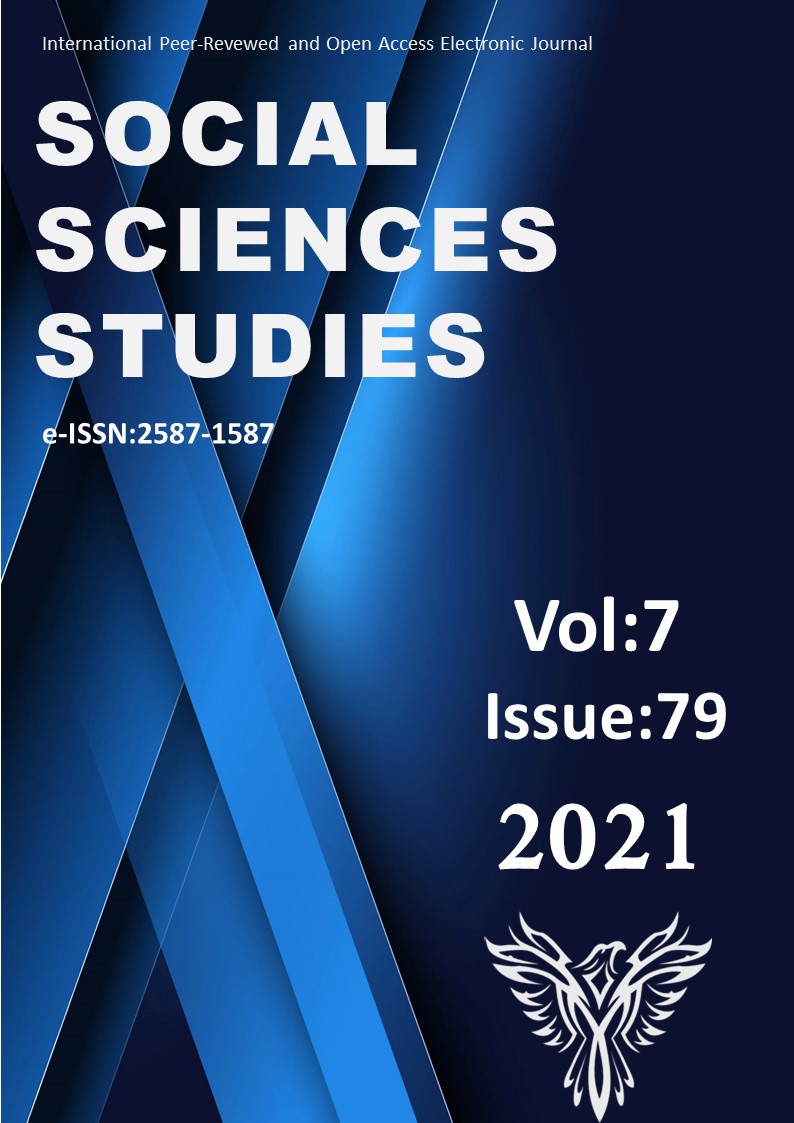Author :
Abstract
Bu araştırmada Kastamonu Üniversitesinde, sağlık eğitiminin yoğun olarak verildiği Sağlık Bilimleri Fakültesi öğrencileri ile sağlık eğitiminin yoğun olarak verilmediği Orman Fakültesi öğrencilerinin, sağlıklı yaşam biçimi davranışlarını etkileyen değişkenler arasındaki ilişkinin karşılaştırılması amaçlanmıştır. Tanımlayıcı ve kesitsel nitelikte olan bu araştırma, 2018-2019 akademik yılı bahar döneminde Kastamonu Üniversitesi Sağlık Bilimleri ve Orman Fakültesinde öğrenim gören 139 Sağlık Bilimleri ve 111 Orman Fakültesi öğrencisi ile yürütülmüştür. Verileri 10 sorudan oluşan anket formu ve Sağlıklı Yaşam Biçimi Davranışları II Ölçeği ile toplanmış, One way Anova, Pearson korelasyon ve Student t testi ile analiz edilmiştir. Öğrencilerin %55.6’sını Sağlık Bilimleri ve %44.4’ünü Orman Fakültesi oluşturmuştur. Her iki grupta da öğrencilerinin sağlıklı yaşam biçimi davranışlarının orta (Sağlık=127.41±19.56; Orman=129.45±16.43), olduğu ancak Orman Fakültesi öğrencilerinin, Sağlık Bilimleri Fakültesi öğrencilerine göre sağlıklı yaşam biçimi puanlarının daha yüksek olduğu ve aralarında istatistiksel farkın anlamlı belirlenmiştir (p<0.05). Sağlık Bilimleri Fakültesinde öğrenim görenlerin sağlıkla ilgili aldıkları derslerin sağlık davranışlarını etkilemediği tespit edilmiştir. Sosyo-demografik özelliklerden yaşın ve “Sağlıklı yaşam biçimi davranışlarını yaşamınızda uyguluyor musunuz?” sorusuna “Evet” diyen öğrencilerin sağlıklı yaşam biçimi davranışları ölçek puanları arasında anlamlı bir ilişki saptanmıştır (p<0.05). Sağlık ve Orman Fakültesi öğrencilerinin sağlıklı yaşam biçimi davranışları orta düzeyde tespit edilmiş olup, arada fark bulunamamıştır (p>0.05). Sağlık bilimlerinde okuyan öğrenciler dahil, sağlıklı yaşam biçimi davranışlarının üniversite öğrencilerinde geliştirmeye yönelik eğitim programlarının üniversite genelinde planlanarak uygulanması sağlığın korunması açısından son derece önemlidir.
Keywords
Abstract
In this study, it was aimed to compare the relationship between the variables affecting the healthy lifestyle behaviors of the students of the Faculty of Health Sciences in Kastamonu University, where health education is given intensively, and the students of the Faculty of Forestry where health education is not given intensively.This descriptive and cross-sectional study was conducted with 139 Health Sciences and 111 Forestry Faculty students studying at Kastamonu University Health Sciences and Forestry Faculty in the spring semester of the 2018-2019 academic year. Data were collected using a 10-question questionnaire and Healthy Lifestyle Behaviors II Scale, and analyzed with One way Anova, Pearson correlation and Student t test. 55.6% of the students were Health Sciences and 44.4% Faculty of Forestry. The healthy lifestyle behaviors of the students in both groups were moderate (Health = 127.41 ± 19.56; Forest = 129.45 ± 16.43), but the healthy lifestyle scores of the students of the Faculty of Forestry were higher than the students of the Faculty of Health Sciences and the statistical difference between them was found to be significant (p <0.05).It has been determined that the health-related courses taken by those studying at the Faculty of Health Sciences do not affect their health behaviors. Among the socio-demographic characteristics, age and "Do you apply healthy lifestyle behaviors in your life?" There was a significant relationship between the healthy lifestyle behaviors scale scores of the students who answered “Yes” to the question (p <0.05). The healthy lifestyle behaviors of the students of the Faculty of Health and Forestry were determined at a moderate level, and there was no difference (p> 0.05). It is extremely important for the protection of health that educational programs to develop healthy lifestyle behaviors in university students, including those studying in health sciences, are planned and implemented throughout the university.
Keywords
- Demirtaş, A. & Özdemir, A. (2021). “Üniversite Öğrencileri Arasındaki Sağlıklı Yaşam Biçimi Davranışlarının Kesitsel
- Değerlendirilmesi” International Social Sciences Studies Journal, (e-ISSN:2587-1587) Vol:7, Issue:79; pp:1001-1010 ÜNİVERSİTE ÖĞRENCİLERİ ARASINDAKİ SAĞLIKLI YAŞAM BİÇİMİ DAVRANIŞLARININ KESİTSEL DEĞERLENDİRİLMESİ A Cross-Sectional Evaluation Of Healthy Living-Style Behaviors Among University Students Dr. Öğr. Üyesi. Ayla DEMİRTAŞ Sağlık Bilimleri Üniversitesi, Gülhane Hemşirelik Fakültesi, İç Hastalıkları Hemşireliği Bölümü, Ankara/TÜRKİYE ORCID ID: https://orcid.org/0000-0001-7952-770x Öğr. Gör. Ayşe ÖZDEMİR Kastamonu Üniversitesi, Tosya Meslek Yüksekokulu, Mülkiyeti Koruma ve Güvenlik Bölümü, Kastamonu/TÜRKİYE ORCID ID: https://orcid.org/0000-0001-5106-6657 ÖZET Bu araştırmada Kastamonu Üniversitesinde, sağlık eğitiminin yoğun olarak verildiği Sağlık Bilimleri Fakültesi öğrencileri ile sağlık eğitiminin yoğun olarak verilmediği Orman Fakültesi öğrencilerinin, sağlıklı yaşam biçimi davranışlarını etkileyen değişkenler arasındaki ilişkinin karşılaştırılması amaçlanmıştır. Tanımlayıcı ve kesitsel nitelikte olan bu araştırma, 2018-2019 akademik yılı bahar döneminde Kastamonu Üniversitesi Sağlık Bilimleri ve Orman Fakültesinde öğrenim gören 139 Sağlık Bilimleri ve 111 Orman Fakültesi öğrencisi ile yürütülmüştür. Verileri 10 sorudan oluşan anket formu ve Sağlıklı Yaşam Biçimi Davranışları II Ölçeği ile toplanmış, One way Anova, Pearson korelasyon ve Student t testi ile analiz edilmiştir. Öğrencilerin %55.6’sını Sağlık Bilimleri ve %44.4’ünü Orman Fakültesi oluşturmuştur. Her iki grupta da öğrencilerinin sağlıklı yaşam biçimi davranışlarının orta (Sağlık=127.41±19.56; Orman=129.45±16.43), olduğu ancak Orman Fakültesi öğrencilerinin, Sağlık Bilimleri Fakültesi öğrencilerine göre sağlıklı yaşam biçimi puanlarının daha yüksek olduğu ve aralarında istatistiksel farkın anlamlı belirlenmiştir (p<0.05). Sağlık Bilimleri Fakültesinde öğrenim görenlerin sağlıkla ilgili aldıkları derslerin sağlık davranışlarını etkilemediği tespit edilmiştir. Sosyo-demografik özelliklerden yaşın ve “Sağlıklı yaşam biçimi davranışlarını yaşamınızda uyguluyor musunuz?” sorusuna “Evet” diyen öğrencilerin sağlıklı yaşam biçimi davranışları ölçek puanları arasında anlamlı bir ilişki saptanmıştır (p<0.05). Sağlık ve Orman Fakültesi öğrencilerinin sağlıklı yaşam biçimi davranışları orta düzeyde tespit edilmiş olup, arada fark bulunamamıştır (p>0.05). Sağlık bilimlerinde okuyan öğrenciler dahil, sağlıklı yaşam biçimi davranışlarının üniversite öğrencilerinde geliştirmeye yönelik eğitim programlarının üniversite genelinde planlanarak uygulanması sağlığın korunması açısından son derece önemlidir. Anahtar kelimeler: Üniversite öğrencisi, sağlıklı yaşam biçimi, sağlıklı yaşam davranışı ABSTRACT
